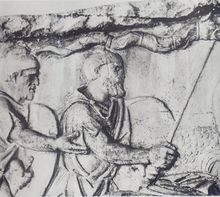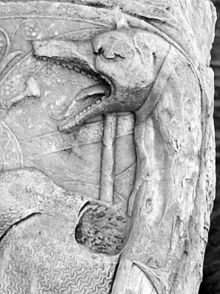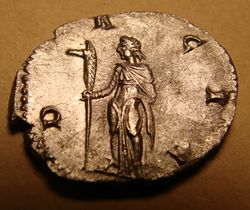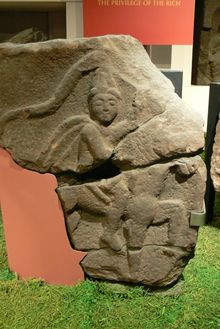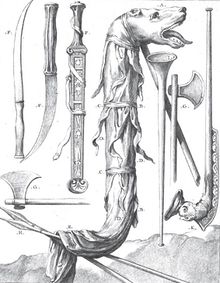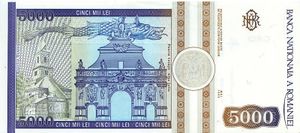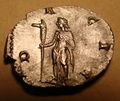التنين الداتشي
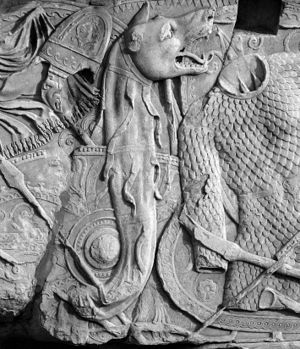
التنين الداتشي Dacian Draco : أو الذئبة و شعار الحرب Dacian warfare تحول لاحقا لشعار روما ,
حاليا شعار الكثير من الأندية الإيطالية وأشهرهم نادي روما , حتي إسم رومانيا والرومان وروما, وكثير من الطليان يقر بأن الرومان لهم أصول رومانية,
دراكوناريوس Draconarius : كان نوعًا من العلامات التي تحمل معيار الفرسان المعروف باسم دراكو في الجيش الروماني .
The draco first appears on Trajan's Column in Rome, a monument that depicts the Dacian wars of 101–102 AD and 105–106 AD. German historian Conrad Cichorius notes that, even though Dacians carry the draco, it was called the Scythian draco in Arrian's Tactica written around 136 AD.[1] According to Ellis Minns, the dragon standards of the Arrian were those of the Dacians.[2]
. . . . . . . . . . . . . . . . . . . . . . . . . . . . . . . . . . . . . . . . . . . . . . . . . . . . . . . . . . . . . . . . . . . . . . . . . . . . . . . . . . . . . . . . . . . . . . . . . . . . . . . . . . . . . . . . . . . . . . . . . . . . . . . . . . . . . . . . . . . . . . . . . . . . . . . . . . . . . . . . . . . . . . . .
Representations of the Dacian Draco
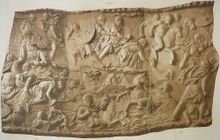
Trajan's Column in Rome
Roman coins of Dacia
The draco appears on coins of Roman Emperor Antoninus Pius (r.138–161 AD), indicating that it was still the characteristic emblem in the 2nd century.[3][4] In AD 250 on a coin of Decius the Roman province of Dacia holds a wolf- or hound-dragon standard.[5] The same type also occurs on antoniniani coins of Claudius Gothicus (r.268–270) and Aurelian (r.270–275).[6]
Arch of Galerius in Thessaloniki
The characteristic Dacian dragon emblem is carried by a group of Dacian horsemen depicted on the Arch of Galerius and Rotunda in Thessaloniki, Greece.[7]
Funerary sculptured monument of Chester
Votive tablets
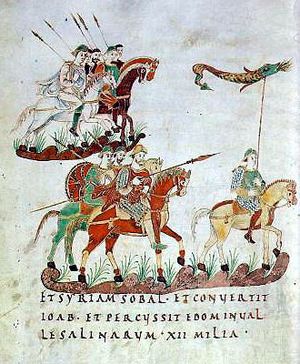
A draco banner is carried by one of the Danubian Riders, native Dacian deities, on a Danubian plaque ascribed to the first two decades of the 4th century.[8] Because of the great importance of this symbol in the religious and military life of the Dacians, some writers believe that the draco must have been directly adopted and reproduced on the so-called Danubian plaques dating to the 3rd–4th centuries.[9] According to some researchers such as Dumitru Tudor, the presence of this military ensign on the Danubian plaques is explained simply as due to chance — the result of a fortuitous combination of horseman and sky-god themes through the imagination of native sculptors.[10]
Copies
لاحقا تحورت في رومانيا إلي Dracula الشهير بمصاص الدماء والمستذئب ضد الأتراك المسلمين في البلقان.
See also
- Dacian warfare
- Draconarius
- Draco (constellation)
- Draco (military standard)
- European dragon
- Bunchuk
- Olm (Proteus anguinus)-A species of cave Salamander of Slovenia locals call baby cave dragon
Gallery
Dacian Draco at the National Military Museum, Romania
Dacian Draco on Trajan's Column
Dacian Draco on Trajan's Column cf. Grigore Tocilescu
Dacian Draco from Trajan's Column cf. Michel-François Dandré-Bardon
Dacian Draco Bearer in Dacian Wars by Victor Duruy
The new Bitdefender antivirus logo showcasing the Dacian Draco
Tiamat, the chaos monster from Babylonian religion
Dacian gold bracelet with snake-motif, dated to 1st century BC – 1st century AD, from Sarmizegetusa, Romania
Notes
- ^ Milner 1997, p. 20.
- ^ Minns 1913, p. 78.
- ^ Toynbee 1934, pp. 148-149.
- ^ Damian 2002, p. 1.
- ^ Speidel 2004, pp. 191.
- ^ Toynbee 1934, pp. 80.
- ^ Makaronas 1970, p. 41.
- ^ Tudor 1976, p. 82 and 141.
- ^ Tudor 1976, p. 115.
- ^ Tudor 1976, p. 114.
References
- Ashmore, Harry S. (1961). Encyclopædia Britannica. Encyclopædia Britannica.
{{cite book}}: Invalid|ref=harv(help) - Den Boeft, J.; Den Hengst, D. (1987). Philological and historical commentary on Ammianus Marcellinus XX: Volume 4 edited by H. C. Teitler. John Benjamins Pub Co. ISBN 978-90-6980-012-7.
{{cite book}}: Invalid|ref=harv(help) - Brzezinski, Richard (2002). The Sarmatians, 600 BC-AD 450. Osprey Publishing. ISBN 978-1-84176-485-6.
{{cite book}}: Invalid|ref=harv(help) - Bury, John Bagnell; Cook, Stanley Arthur; Adcock, Frank Ezra (1954). The Cambridge ancient history: Volume 8. Cambridge University Press.
{{cite book}}: Invalid|ref=harv(help) - Crisan, Ion Horatiu (1986). Spiritualitatea geto-dacilor: repere istorice. Editura Albatros.
{{cite book}}: Invalid|ref=harv(help) - Coulston, Jon C. N. (1990). "The Architecture and Construction Scenes on Trajan's Column". In Martin, Henig (ed.). Architecture and architectural sculpture in the Roman Empire. Oxford University Committee for Archaeology. pp. 39–50.
{{cite book}}: Invalid|ref=harv(help) - Coulston, Jon C. N. (1991). "The 'draco' standard". Journal of Military Equipment Studies. 2: 101–114.
{{cite journal}}: Invalid|ref=harv(help) - Damian, Paul Cristian (2002). "Teza de doctorat: Geto-dacii în configuratia demografica a Daciei romane (SURSE NUMISMATICE)". Archived from the original on April 13, 2012.
{{cite web}}: Invalid|ref=harv(help) - Dandré-Bardon, Michel-François (1774). Costume des anciens peuples, a l'usage des artistes. Paris: Alexandre Jombert the younger.
{{cite book}}: Invalid|ref=harv(help) - Dupuy, Trevor N. (1993). International Military & Defense Encyclopedia, 2. Brassey's. ISBN 978-0-02-881062-1.
{{cite book}}: Invalid|ref=harv(help) - Everitt, Anthony (2010). Hadrian and the Triumph of Rome. Random House Trade Paperbacks. ISBN 978-0-8129-7814-8.
{{cite book}}: Invalid|ref=harv(help) - Haynes, Denys (1995). The Portland Vase: A Reply p. 146-152. The Journal of Hellenic studies edited by Percy Gardner, Max Cary, Ernest Arthur Gardner.
{{cite book}}: Invalid|ref=harv(help) - Hunter, Fraser (2009). "Barbarians and their equipment on Roman provincial sculpture". Les ateliers de sculpture régionaux : techniques, styles, et iconographie : actes du Xe Colloque international sur l'art provincial romain, Arles et Aix-en-Provence, 21-23 mai 2007. Musée départemental Arles antique. ISBN 978-2-916504-05-6.
{{cite book}}: Invalid|ref=harv(help) - Ispas, Sabina (1980). "Considerations on the Ballad "The Snake" in the Romanian Folklore pp.277-288". Actes du IIe Congrès international de thracologie: Linguistique, ethnologie (ethnographie, folkloristique et art populaire) et anthropologie. Editura Academiei.
{{cite book}}: Invalid|ref=harv(help) - Janicke, Paul M (2006). Modern Patent Litigation: Cases, Comments, and Notes. Carolina Academic Pr. ISBN 978-1-59460-207-8.
{{cite book}}: Invalid|ref=harv(help) - Lioi, Anthony (2007). Of Swamp Dragons. University of Georgia Press. ISBN 978-0-8203-2886-7.
{{cite book}}: Invalid|ref=harv(help) - Makaronas, Ch. J (1970). The Arch of Galerius at Thessaloniki. Institute for Balkan Studies.
{{cite book}}: Invalid|ref=harv(help) - McClintock, John (1889). Cyclopaedia of Biblical, theological, and ecclesiastical literature, Volume 12. Harper and Brothers, Publishers.
{{cite book}}: Invalid|ref=harv(help) - Mihăilescu-Bîrliba, Lucreţiu (2009). "A Funerary Sculptured Monument of Chester and its Representation" (PDF). Studia Antiqua et Archaeologica. Editura Universitatii "Alexandru Ioan Cuza". XV: 149–176. ISSN 1224-2284.
{{cite journal}}: Invalid|ref=harv(help) - Milner, N.P. (1997). Epitome of Military Science by Vegetius. Liverpool University Press. ISBN 978-0-85323-910-9.
{{cite book}}: Invalid|ref=harv(help) - Minns, Ellis Hovell (2011) [1913]. Scythians and Greeks: A Survey of Ancient History and Archaeology on the North Coast of the Euxine from the Danube to the Caucasus. Cambridge University Press. ISBN 978-1-108-02487-7.
{{cite book}}: Invalid|ref=harv(help) - Osborne, Harold (1985). The Oxford Companion to the Decorative Arts. Oxford University Press. ISBN 978-0-19-281863-8.
{{cite book}}: Invalid|ref=harv(help) - Palmer, Abram Smythe (1882). Dictionary of verbal corruptions or words perverted in form or meaning, by false derivation or mistaken analogy. George Bell and Sons.
{{cite book}}: Invalid|ref=harv(help) - Pârvan, Vasile (1926). Getica (in Romanian and French). București, Romania: Cvltvra Națională.
{{cite book}}: Invalid|ref=harv(help)CS1 maint: unrecognized language (link)[dead link] - Pârvan, Vasile (1928). Dacia: An Outline of the Early Civilization of the Carpatho-Danubian Countries. The University Press.
{{cite book}}: Invalid|ref=harv(help) - Poruciuc, Anneliese (2000). "Protective Snakes and Frightening Fairies A Transylvanian Saxon's view on Romanian folklore of the early twentieth century page 73-79". Romanian civilization. The Romanian Cultural Foundation. ISSN 1220-7365.
{{cite book}}: Invalid|ref=harv(help) - SCOROBETE, Miron (2008). "In memoriam Nicolae Adam". Cetatea Culturala 'Cultural Fortress' , Revistă de cultură, literatură şi artă 'Journal of Culture, Literature and Art' (in Romanian). S.C. SEDAN CASA DE EDITURĂ S.R.L.
{{cite book}}: Invalid|ref=harv(help)CS1 maint: unrecognized language (link) - Scott-Giles, Charles Wilfrid (1957). The romance of heraldry. Dutton.
{{cite book}}: Invalid|ref=harv(help) - Sîrbu, Valeriu (1997). Imaginar şi imagine în Dacia preromană. Editura Istros.
{{cite book}}: Invalid|ref=harv(help) - Speidel, Michael (2004). Ancient Germanic Warriors: Warrior Styles from Trajan's Column to Icelandic Sagas. Routledge. ISBN 0-203-47587-9.
{{cite book}}: Invalid|ref=harv(help) - Tomaschek, Wilhelm (1883). Les restes de la langue dace (in French). Le Muséon.
{{cite book}}: Invalid|ref=harv(help)CS1 maint: unrecognized language (link) - Toynbee, Jocelyn M. C (1934). The Hadrianic school: a chapter in the history of Greek art. Cambridge University Press.
{{cite book}}: Invalid|ref=harv(help) - Tudor, Dumitru (1976). Corpus Monumentorum Religionis Equitum Danuvinorum: The Analysis and Interpretation of the Monuments. Brill Academic Pub. ISBN 978-90-04-04493-7.
{{cite book}}: Invalid|ref=harv(help) - Vere, Nicholas de (2004). The Dragon Legacy: The Secret History of an Ancient Bloodline. Book Tree. ISBN 1-58509-131-6.
{{cite book}}: Invalid|ref=harv(help) - Yust, Walter (1953). Encyclopædia Britannica: a new survey of universal knowledge. Encyclopædia Britannica.
{{cite book}}: Invalid|ref=harv(help)
. . . . . . . . . . . . . . . . . . . . . . . . . . . . . . . . . . . . . . . . . . . . . . . . . . . . . . . . . . . . . . . . . . . . . . . . . . . . . . . . . . . . . . . . . . . . . . . . . . . . . . . . . . . . . . . . . . . . . . . . . . . . . . . . . . . . . . . . . . . . . . . . . . . . . . . . . . . . . . . . . . . . . . . .
Further reading
- Gelu Florea - Dragonul dacic, în Archeologica et Historica, Nicolae Gudea dicata, Zalău, 2001, p. 195-201;
- Augustin Muresan - Cu privire la cea mai veche reprezentare a a stindardului geto-dacilor, în Adevărul omenește posibil pentru rânduirea binelui, Oradea, 2001, pag. 455-459;
- Liviu Marghitan, Stindardul dacic flutura la Tapae, în Revista de istorie militara, 2001, 1, pag. 52-55.
- Liviu Mărghitan, Mioara Turcu - Mărturii arheologice referitoare la stindardul geto-dacilor, în Thraco-dacica, 2001, 22, nr. 1-2, pag. 213-221.
- Mioara Alecu-Călușiță, Steagul geto-dacilor, în Noi Traci. Centro Europeo di Studii Traci, Roma, 1992, pag. 14-22;
- Traian Herseni - Le dragon dace, în Ethnologica, 1979, nr. 1, pag. 13-22.
وصلات خارجية
غجر , جوتيون, مانيون, ميديون,
